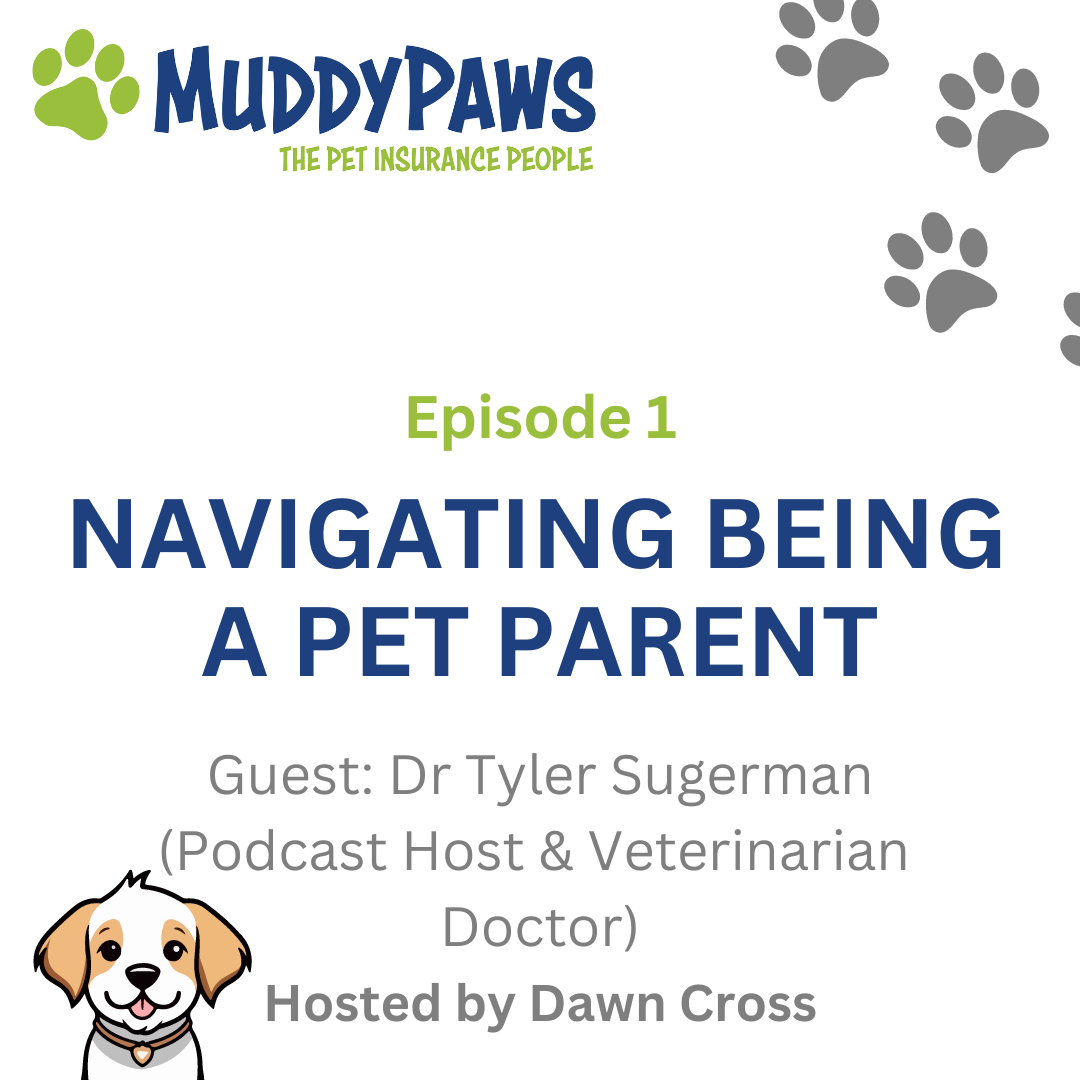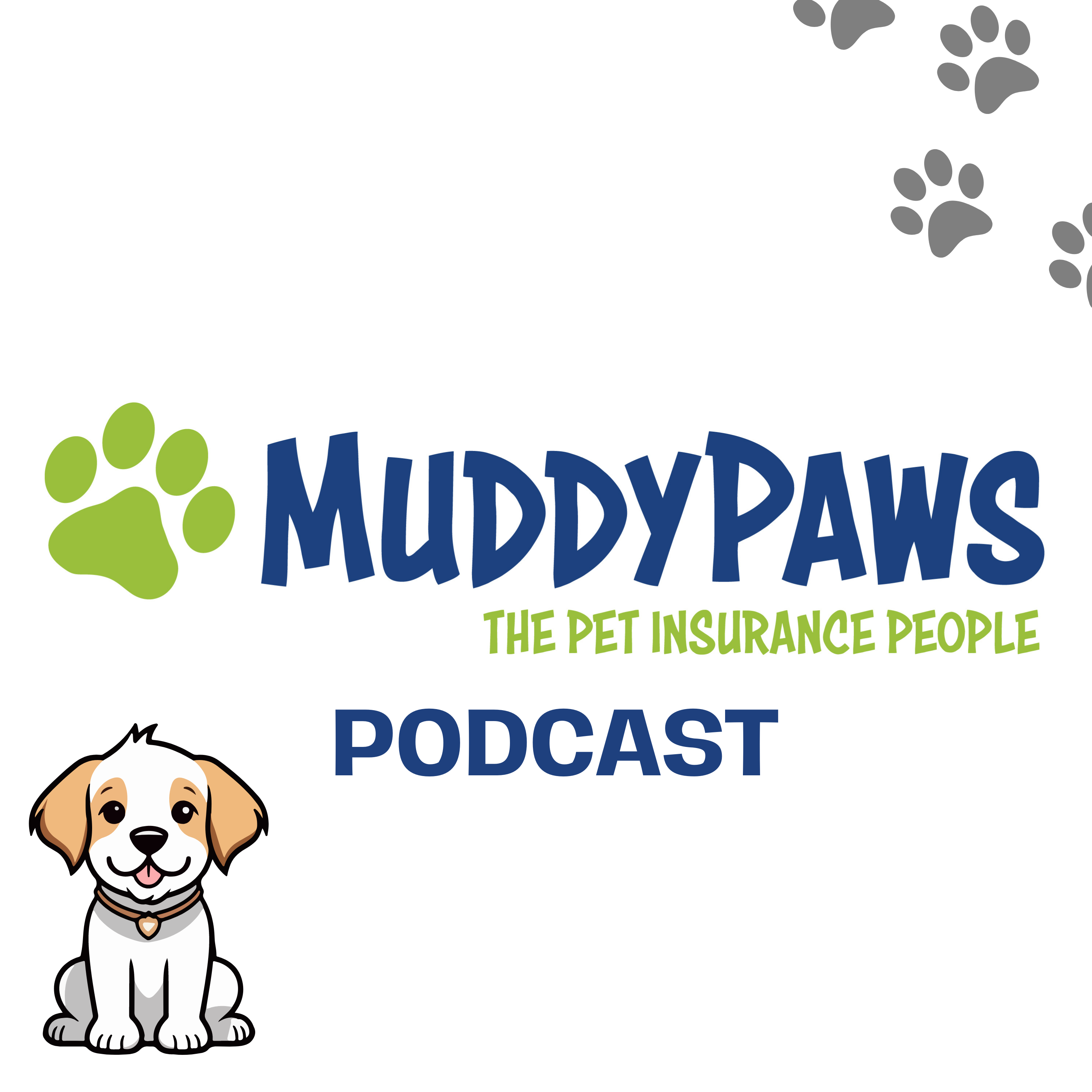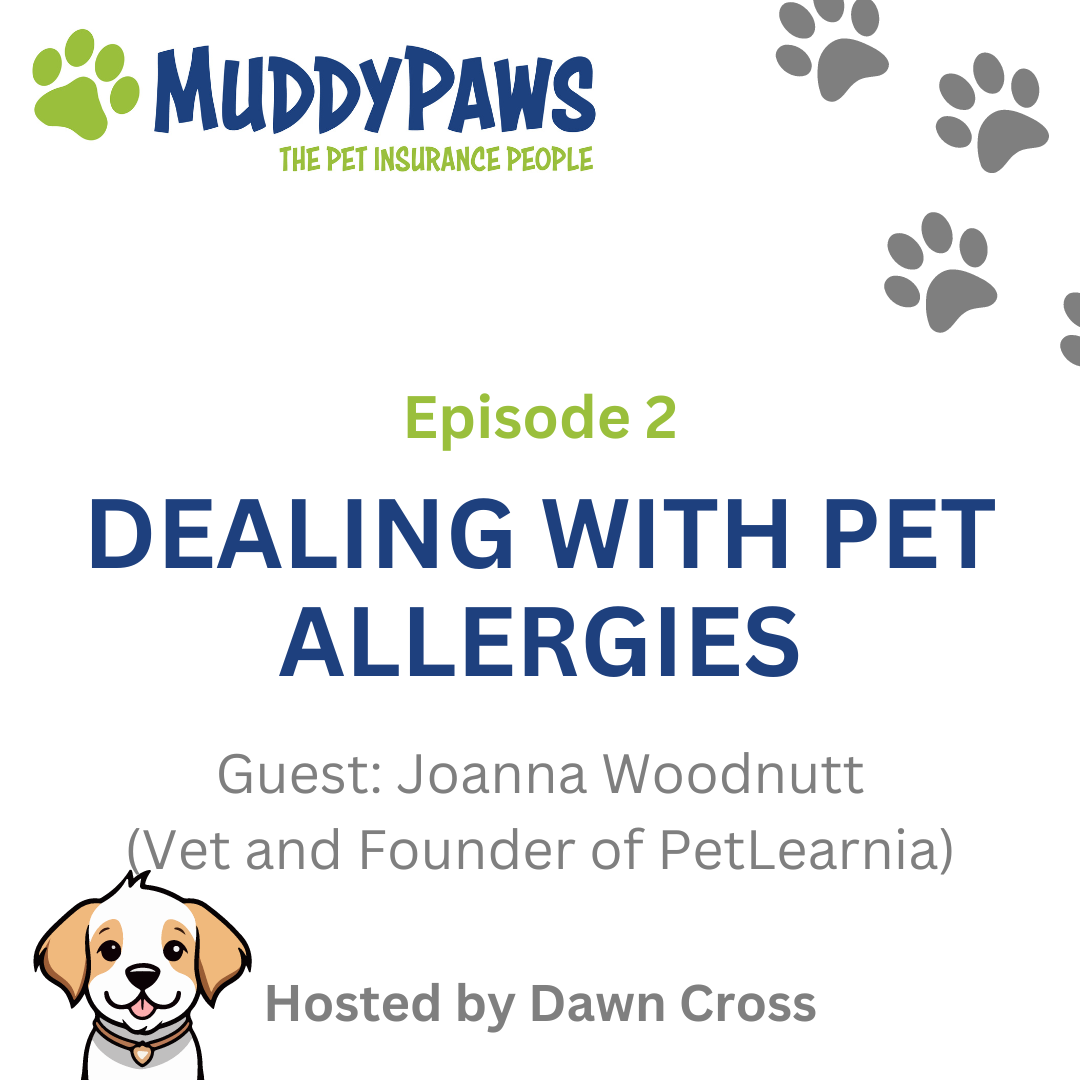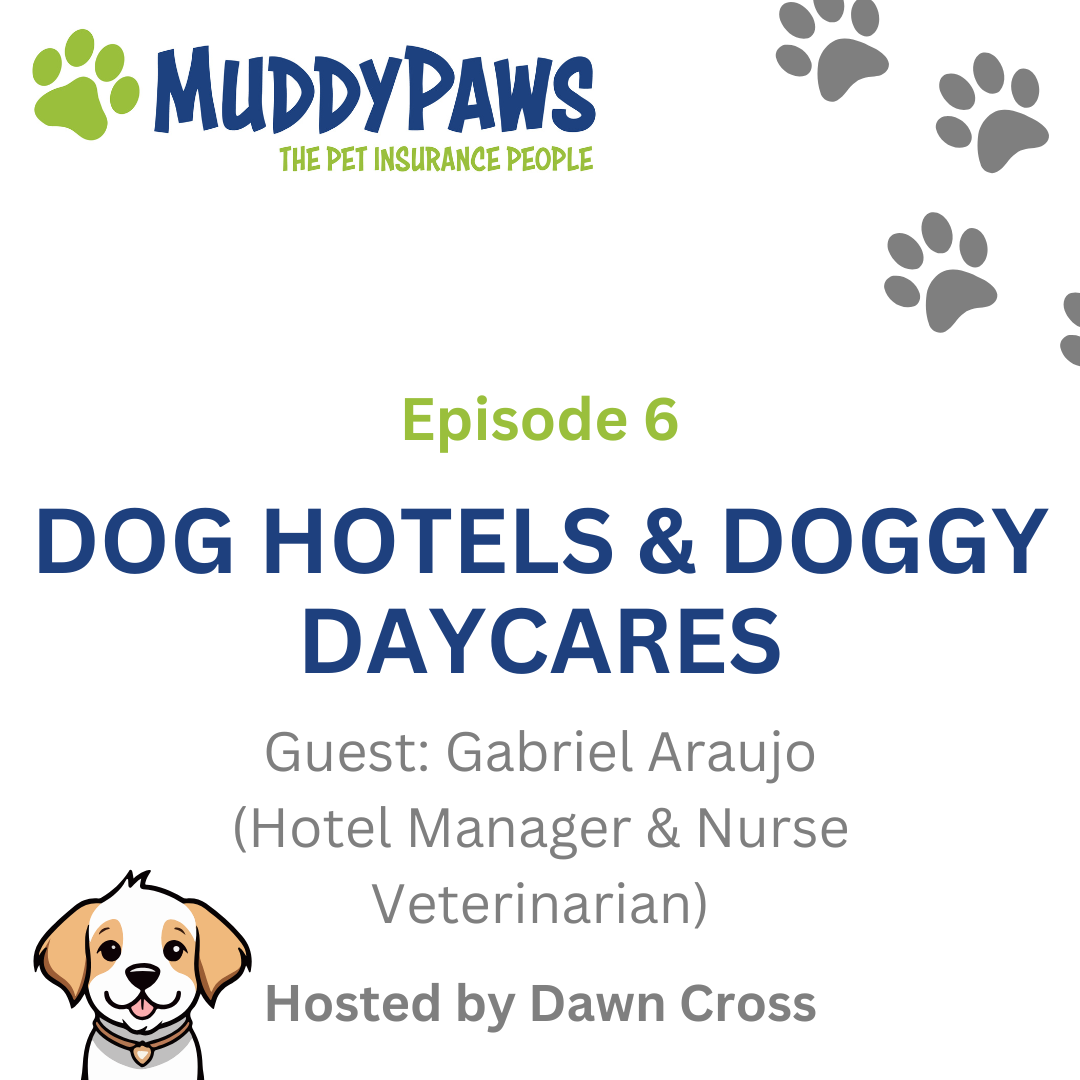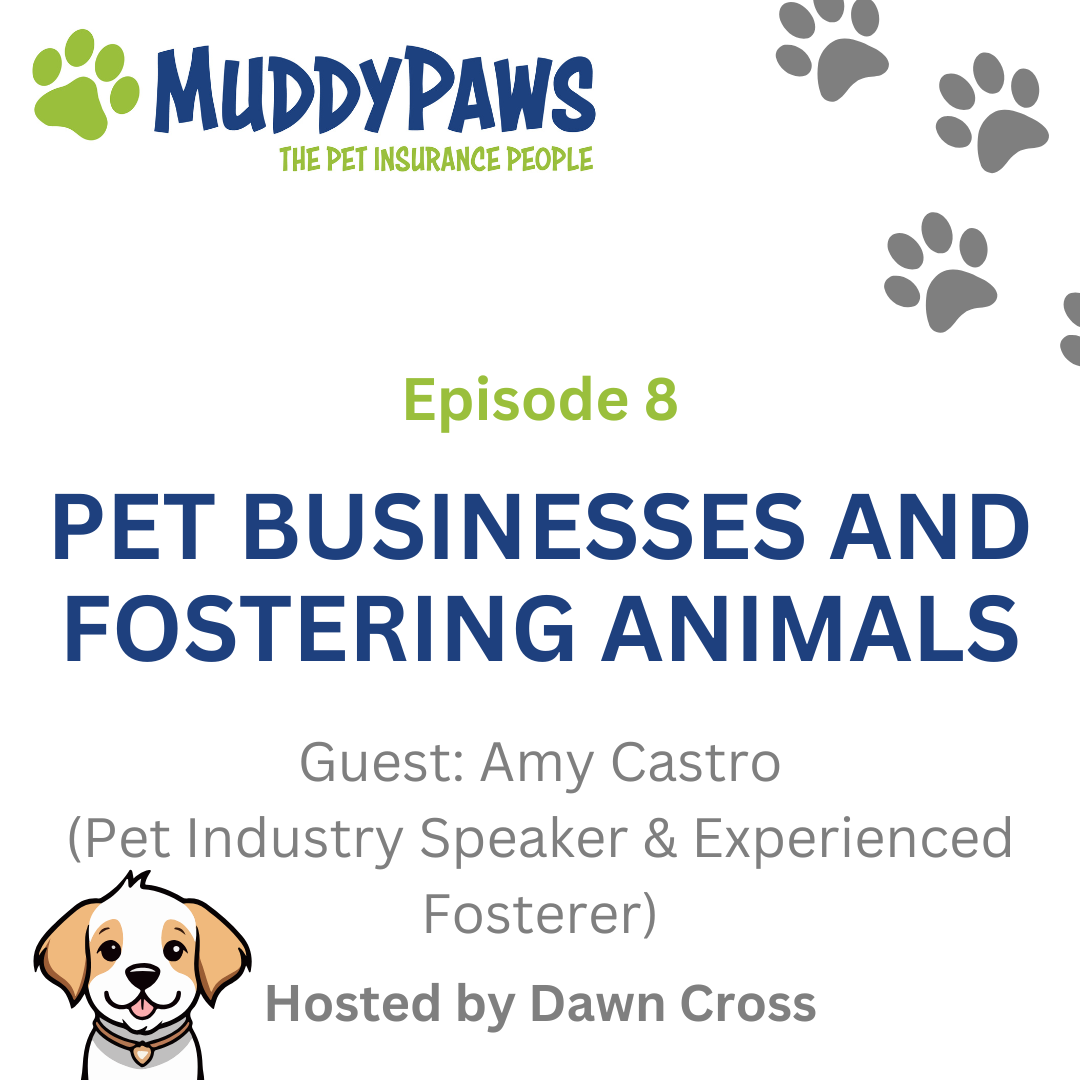Episode Transcript
[00:00:02] Speaker A: Welcome to the Muddy Paws Insurance podcast. I'm your host, Dawn Cross, and today I'll be discussing navigating being a pet parent with Doctor Tyler Sugarman, podcast host and vet.
If you enjoy our podcast, make sure to leave a rating on your favorite podcast directory.
Brilliant. So if I could get you to start off, could you introduce yourself and what you get up to?
[00:00:25] Speaker B: Yeah. So I am doctor Tyler Sugarman. I am an emergency veterinarian and a podcast host. So I've been in the veterinary field since I was like 13 years old and progressed to emergency medicine and didn't really think I was going to be doing podcasting, but I really like helping to educate pet parents, so I kind of got into that.
[00:00:47] Speaker A: That sounds amazing. Like, how did you get into veterinarianism anyway? Was it something you've always wanted to do or just kind of find your passion?
[00:00:55] Speaker B: Yeah, I had always kind of wanted to help little animals since I was young. Like, I would bring in lizards that had their tails lost. Of course, they didn't really need helping, but I didn't know that when I was a kid, you know, I would bring, I had brought a chicken home one time to help, like make it feel better. So I always kind of wanted to help animals and then eventually was able to start a program in middle school where they allow you to go to whatever job you feel like you're, you want to get into and just start like practicing and learning and watching what they do. And so I started that at age 13, but they immediately hired me. So I started actually working in the veterinary field. And the more I was in it, the more I realized that I wanted to stay in the veterinary field for a long time. I was actually a veterinary technician and did not want to pursue becoming a veterinarian until I realized I just needed so much more information. I just always wanted to learn more and then realized I needed to go further with my education as well.
[00:02:03] Speaker A: Oh, wow. Very passionate from a very young age, then.
[00:02:07] Speaker B: Yeah, absolutely.
[00:02:09] Speaker A: Sounds brilliant. I really love hearing the backstories of everybody that comes onto a podcast. You know, how did they get there? And it's really great to hear as well. It's always just been at the forefront of your mind. If you don't mind me asking, could you tell me a bit more about your podcast before we get to any of that questions?
[00:02:25] Speaker B: Yeah, so my podcast is for pet parents to kind of help understand, like diseases and help understand. I even do, like, general practice things like we talked about vaccines and tick prevention and heartworm prevention, things like that, but my goal is to try to help make pet parents part of their pets healthcare. I think a lot of people walk in and they're like, well, I'm not sure what medication they're on or why.
I don't know what disease that they have. I just know it has something to do with the liver. So I want them to be really well informed. And I know on the veterinary side of things, we don't always have a lot of time. So I'm in an emergency. So I'm running from one emergency to the next a lot of times. And I don't have that hour to spend with somebody to really be able to focus on what information I want them to know. So that way they walk out of the clinic knowing exactly what the next steps are. And so I had created this podcast as a way to do that. So that way I could be like, okay, I know you probably didn't understand, you know, the 20 things I just told you in five minutes. So here's something you could be able to listen to later, and you can listen to it over and over again. If I. If I gave the information to the wife, then the husband can listen to it later. You know, I just want it to be that everybody gets that same information and gets accurate information, not just what they. Not just, they go home, I give them a diagnosis, and then they google it.
[00:03:50] Speaker A: No, that sounds amazing as well. And obviously it's coming from you. A font of knowledge. You know, it's not Google, though. It can be, you know, some of the best information in the world on there. You can definitely get onto the wrong sites, wrong information or, you know, the wiki sites were actually not necessarily been updated with proper professional advice. It might just be other people which could get it wrong, and then you're just clasping at straws just like, well, what is right or what's wrong? So that sounds like a really amazing resource.
[00:04:16] Speaker B: Exactly. Even when people start going to social media, you know, that's just, just what people have been through. It's not really like the true information.
[00:04:24] Speaker A: Oh, definitely. And I think one thing probably everybody forgets to consider is every case and every pet is different and might react differently to certain things or present with different symptoms in different ways that may not have been from, like, their previous dog, but, you know, this new dog will react differently because it's slightly different genetics. At the end of the day, I think people forget that, you know, it's not a one case for all sort of situation.
[00:04:49] Speaker B: Yeah, exactly.
[00:04:51] Speaker A: So my first question for you today is obviously, you know, there might be a lot of people who are apparent listening to this or maybe are considering to become one. You know, they want to make that step.
What should they consider when or if they have a pet? Like what should maybe be at the forefront of their minds in terms of their vet self?
[00:05:12] Speaker B: Yeah, I think that lifestyle is a really big thing to consider. So, you know, if you're a very sedentary person and you get a dog, let's say it's a very, very active dog, then a lot of people think, well, because the dog is more active, I'm going to become more active. But, and that's great. We do want people to get out and walk more and stuff. But some of these dogs are like very high energy, high drive. And so, like, they need lots and lots of work. You know, they need not just a walk, they need, they need a job. They need to be going out multiple times a day. They need multiple runs. They need to go to the dog park multiple times a day. So I think just kind of considering lifestyle is a really big thing on the opposite end, you also don't want to be a runner and getting like maybe a small lap dog to run, you know.
So I think lifestyle is really big just to kind of consider that and considering who else is in the house as well. You know, if you don't have a pet but maybe a roommate has a pet, are your roommate's pets and your pet going to get along? If you have a highly reactive pet and then you bring a new pet in, that may not be the best thing for that new pet.
Or if you have kids, make sure you have a pet who's a really good pet for kids, not necessarily one that's going to be a very antisocial type pet. And also thinking about how much they're going to be held or if they want to play fetch with them and stuff. Because people also think about getting little, small pocket pets, which I love pocket pets, but not all kids know how to gently handle pocket pets. So also considering, like, those types of things and also people, I think, don't always consider what's typical for the breed. Not every, you know, I've definitely had a chow mix who, he was not a typical chow. He was not aggressive. He was the nicest dog. But, but that doesn't always mean that they're not going to be like what the breed is normally known for. So just taking those things into consideration, like doing your research beforehand, you know, making sure that it's going to be the right fit instead of, I feel like a lot of people will go out and just decide to, they're like, that day, they're like, I want a dog. And then they just go in, they get a dog, or you see a dog that somebody's selling, and so you just buy the dog rather than, like, doing your research on all of those things.
[00:07:35] Speaker A: Yeah. And I think definitely is, there's a big difference between, I guess, you know, when you purchase a puppy, but also if you're adopting a dog that's had previous experience with different owners, because then you need to consider, you know, maybe actually they don't like kids because they had a rough time with kids in their previous home. And you need to really retake that into account because it's like, you know, at the end of the day, I think it's, you know, it's a big commitment. And obviously that obviously if you do end up returning the dog, it's, you know, it's not a fun time, I think, for both parties because then the dog is like, what did I do wrong? And when actually didn't consider its needs in the first place.
[00:08:10] Speaker B: Yeah, I think the humane societies are really great at trying to, like, weed that out in the first place. You know, a lot of them, they'll put them with kids and see how they do. They'll put them with cats and see how they do. They'll put them with other dogs, like both dogs that are very dominant dogs and dogs that are very submissive dogs and see which ones they do better with, which I think that people should really pay attention to that because they don't want to just adopt the dogs out. They or cats out. They want them to go to the right fit.
[00:08:37] Speaker A: What would you suggest as well? And obviously, we've spoken more predominantly about dogs because obviously they have quite, I'd like to say, active needs, whereas cats are a little bit more passive. Like, what things should people consider, again, with cats? Because, you know, that's a different, whole different range of needs that maybe people don't even think about as well.
[00:08:56] Speaker B: Yeah, absolutely. I think there's both between adoption and purchasing. So I'm going to say real quick, for, like, buying a cat, a lot of people who buy purebred cats don't know that they do have genetic problems. So looking into those things beforehand because you can do testing and stuff on some of them to be able to see if they do have genetic problems.
As far as, like, adopting cats, again, like a lot of times they will talk on there about how maybe they are a very shy cat, and so you don't want to have them with a lot of other cats because then we might have behavioral issues like not wanting to use the litter box, not because they're not litter box trained, but because they're too shy or too nervous to get over to the litter box that's next to the other cats, you know? Yeah. Or maybe that cat doesn't do well with dogs and just kind of thinking about those things. And also, again, like, your lifestyle, even though they are very sedentary, you know, they don't really do a lot. We don't have to worry about running them and stuff. They still, like, really a really specific environment. They like really high places and they like really low places. They like to hide in things. And so making sure, like, their environment reflects all of those things. So they can jump up really high for when they want to get away from somebody else or they can go to a lower hiding spot as well.
You know, we have a cat who, she hides in the pantry. That's where she likes to be. And. But a lot of people get worried about that. They're like, well, I don't want anybody in the pantry, so they just shut off the pantry. But if that's, if that's what their need is, we have to adjust around.
[00:10:27] Speaker A: Their needs, I think, as well, people forget is that cats also need, like, that mental stimulation sometimes. They do like to play exactly as well. So, like, having those sort of toys that can be great for them or even just kind of hiding, you know, or just having, like, maybe something attached to the wall that angles, then at least they can fuss around with it. Even if you're not there. They can still kind of have a play when they so wish. I think a lot of people think, oh, cats, you know, they're just sleeping all day or sit on your lap. But, yeah, it's something I think people forget as well, from my experience.
[00:11:04] Speaker B: Yeah, actually, people don't think about this, but cats are actually corpuscular, meaning that they're awake during dawn and dusk. And so they, they really like to play during those periods of time.
So having, like, you're probably not going to be awake at dawn, so you probably want to have something set up. So we have, like, before, I've had ones that are like, this little laser pointer that's on a timer and so it will go off at a certain time. So you'd know, like, when, like, you could do it around the times that they're awake. And so it would actually, like, give them that mental stimulation. Unfortunately, my dogs also liked to play with it, so they broke it. But.
[00:11:41] Speaker A: It'S just the way, isn't it?
[00:11:43] Speaker B: Yeah, exactly. Yeah. Like having some sort of mental stimulation for them. I've had a lot of cats who really, like, there's a toy where there's almost like a tent over a mouse that goes around underneath the tent. They like to, like, be able to catch things underneath things as well. It's like having those kind of things ready to go at that time for them.
[00:12:03] Speaker A: Now that sounds really amazing. So my next question is, what do new pet parents tend to get wrong?
You know, when, you know, they've just gotten the pet or, you know, maybe they're a couple of weeks, couple months in, you know, what is something that you've noticed that they get wrong that maybe we can discuss today to help, you know, future people get right?
[00:12:22] Speaker B: Yeah. You know, the number one thing I see at the vet clinic, actually, is it has to do with insurance. So people assume that if they buy insurance that day for their pet, that it immediately takes into effect.
So I talked to them a lot about. Cause I'll have walked into the room and they're like, don't worry, we just bought the insurance. I'm like, well, it doesn't work that way. Unfortunately. You have to buy the insurance beforehand in order for it to be able to work, because you have 30 days or 90 days or whatever the insurance company lays out for not having any vet visits during that period of time. And also, they think that because they do it right now, like, it won't be on their record as far as it being a predisposing condition, but it still is because now we've been seen during that period of time. So I'd say that that is my number one thing.
Also, my other things are kind of a little bit about what we had talked about before. They didn't really realize the lifestyle of that pet or that they didn't really, like, get along with other pets. So I'll have a lot of new pet parents who adopted a new dog or bought a new dog, and they don't get along. And I get a lot of dog fights as well. Yeah, or cat fights, unfortunately.
Yeah. Diet is another big thing. So I feel like a lot of people overfeed their pet, unfortunately. So on the back of the package, whatever you buy, a lot of times it will give recommendations for how much to feed. But you have to remember it's per day, not per feeding. So it'll say maybe, you know, half a cup but that means half a cup per day. So dividing it into a quarter cup each, each feeding, if that's what they want to do, or also they tend to feed a lot of table scraps or lots of treats and don't take into account that that's still calories. You know, even if it's not being fed at their meal, it's still calories that they're eating. So, yeah, I do think diet is a pretty, pretty big deal because I see a lot of overweight pets that come in as well.
[00:14:25] Speaker A: Yeah, I can definitely see that. And I think as well, you know, it's a lot of people are accustomed to, like, oh, yeah, you just have this last little bit off my plate. And I think then, like you were saying, it feeds into lifestyle, because if you've got dogs that are quite. That don't have a lot of energy, they don't necessarily run about as much. Obviously, if you don't be mindful of those calories. Yeah. Very quickly can become quite overweight, and then that brings a whole new myriad of health problems.
[00:14:50] Speaker B: Exactly.
[00:14:51] Speaker A: As well, which, you know, is really unfortunate, I think, as well, if obviously you'd want to avoid that because you don't want them to be having to try and eat, like, so many medications or even, you know, fork out for those, you know, it's really key. And I'm sure, like you said, you've seen it a lot when it's, like, overweight pets, and it might have been just from that kind of small, little habit of, yeah, you can just have my table scraps and then point out you bring them in and they're waddling in instead of just kind of, you know, walking in like normal.
[00:15:20] Speaker B: Right, exactly.
[00:15:23] Speaker A: That's brilliant. Well, thank you so much. Is there anything else you'd like to add before we wrap up the episode?
[00:15:29] Speaker B: Um, let's see.
I would say real quick, too, like, with some of the things to consider.
One thing that people don't usually think about is if their pet has had some sort of disease before. So I'm specifically for panleukopenia for cats or parvo for dogs. They don't always consider that if they had had a parvo puppy before that lives in the environment for a really long time, up to six years. So you probably don't want to get another puppy unless it's already a vaccinated puppy in order to bring that in. So that way we don't bring that into, you know, a already diseased yard and stuff, or same thing with pan leukopenia. If you had a cat with pan leukopenia that lives in the environment for a really long time as well. So not bringing any new unvaccinated cats into the environment because we also have to consider a lot of finances as well. You know, unless those people are, like, already financially ready to hospitalize a pet, if they end up having parvo or pan leukopenia, then it becomes really hard because we just have this cycle of getting a kitten and then it gets sick and then we get another kitten and it gets sick. So thinking about those things.
And then lastly, like I was saying, with the finances too, I always tell people, you got to make sure, like, you are prepared for whatever those finances are. If you get a puppy or kitten, if you buy a puppy or kitten, they don't come spayed. They always, they don't have all their vaccines, you know, so you have to, like, account for those things versus like, adopting a pet, they always come spayed or neutered. They always have vaccines. And so they're usually, you know, not as much cost for upfront stuff.
[00:17:09] Speaker A: Yeah, definitely. And I guess, you know, depending on who you buy them from, they might already have done that for you or even then they might still be too young to have certain shots as well. So it's always key to keep up to date with those. Or even if you've got like a current animal, like, you know, if you've managed, got their history or not, you need to have that. I think just for peace of mind, you know, you want to look after your animals health, but also at the end of the day, you know, if you find out the wrong way, unfortunately, that they're not vaccinated.
[00:17:35] Speaker B: Exactly.
[00:17:36] Speaker A: And it causes, obviously a lot of heartache, a lot of problems and. Yeah, a lot of financial problems.
[00:17:40] Speaker B: Yeah. And also vaccinated correctly, you know, people will say, well, they personally vaccinated them, but unless they, those vaccines were stored appropriately, it doesn't mean that those vaccines are going to work. So I'll have a lot of people who are like, well, I bought them from a feed store and I gave them myself, but unless the feed store stored them appropriately and you stored them appropriately, which is really hard to know, then they may not be effective.
[00:18:09] Speaker A: Yeah, definitely. I think that's something that is forgotten about as well, the storage of it all.
I think just storage of anything as well. You buy them as people tend to forget, even with food, stuff like that, not storing that correctly, which is insane, really. But if it can happen, so that's something also to be mindful.
[00:18:28] Speaker B: Yeah, I've definitely had a dog a couple weeks ago that they had stored the food in the garage, but it was very moist and then it ended up having molded it. They fed it to the dog and didn't realize until like the third time they fed it to the dog. And by then the dog was very sick, so.
[00:18:44] Speaker A: Oh, no. That sounds awful.
[00:18:46] Speaker B: Yeah.
[00:18:47] Speaker A: Crikey. Well, thank you so much for coming on today. It's been really great to hear from yourself and your expertise.
[00:18:52] Speaker B: Yes, thank you. Really, I really appreciate it.
[00:18:56] Speaker A: Thank you to my guest today, Tyler, for talking about his experience and advice on being a pet parent. If you're interested in his podcast, please click the link in the description.
I have been your host, Dawn Cross, and make sure to click follow for more episodes. Muddy Paws takes pride in keeping things simple. Our goal is to provide a reliable insurance policy that's well delivered and gives you peace of mind. Intelligent underwriting, a user friendly application, and outstanding customer service ensure we stand out from the crowd and provide the best for your furry friends.
